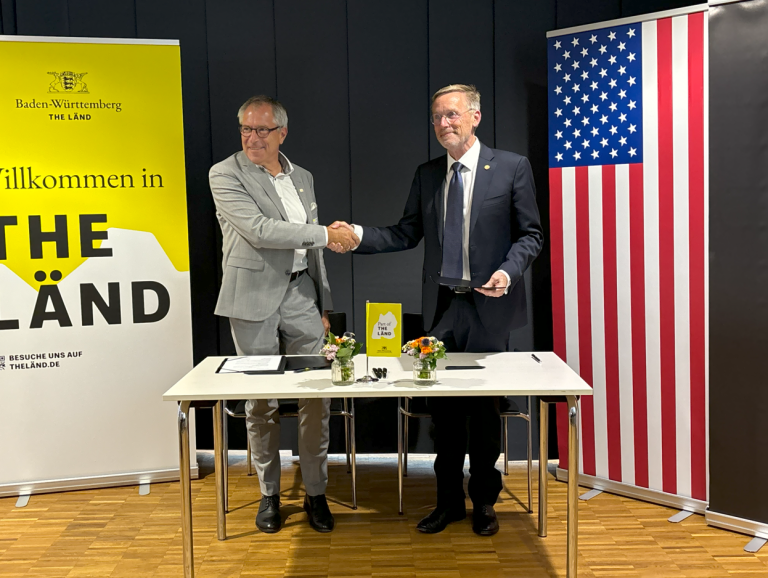
“As we sign the new Memorandum of Understanding, we do so with a renewed sense of purpose and enthusiasm. Together, we will strive to enhance our programs, expand our research collaborations, and create even more opportunities for our students and faculty.”
Celebrating 30 Years of International Collaboration: Kettering University’s Exchange Program Anniversary
Kettering University proudly marked the 30th anniversary of its partnership with four Universities of Applied Sciences in Baden-Wuerttemberg, Germany. A weeklong series of events celebrating this milestone culminated in a symposium on Artificial Intelligence and Autonomous Driving hosted by our partners in Konstanz, Germany, on July 10, 2024. The symposium showcased the innovative research conducted by faculty members from all participating institutions and fostered new partnerships and collaborations.
The symposium featured distinguished speakers from Kettering University, including:
- Dr. Jungme Park, Associate Professor of Computer Engineering, who discussed "Enhancing Environmental Perception for Autonomous Driving using DNN and Sensor Fusion Technologies."
- Dr. Girma Tewolde, Professor of Computer Engineering, who presented "Autonomous Mobility Teaching and Research Activities at Kettering University."
- Dr. Lisa Gandy, Associate Professor of Computer Science, who explored "Using Large Language Models in Medical Technology."
- Dr. Seyed Jamaleddin Mostafavi Yazdi, Assistant Professor of Mechanical Engineering, who spoke about "Leveraging Physics-Informed Neural Networks for Advanced Mechanical Characterization and Optimization of Lattice Structures."
In July 1994, a delegation of educators from Baden-Wurttemberg traveled to Flint, Michigan, and visited Kettering University, then called GMI Engineering and Management Institute or GMI/EMI, to sign the first agreement with then-University President Dr. Jim John. The first semester-long exchanges began in 1996, allowing Kettering University students to experience life in Germany while earning college credit and bringing German students into the Kettering community. It was the first exchange program of its kind in Kettering University's history. Today, the program is the University’s largest and most active exchange program.
More than 3,400 students and faculty members have participated during the program’s 30-year existence. These exchanges have fostered collaborative research and innovations that have enriched learning for students and faculty on both sides of the Atlantic. The program has allowed Kettering students, who have rigid schedules due to Co-op and rigorous 11-week academic terms, to enjoy a study abroad experience, as the Baden-Wurttemberg universities modified their schedules to match Kettering’s term calendar and length.
“Studying abroad encourages our students to develop the skills needed to succeed in the workplace, such as intercultural communication, problem-solving, and adaptability,” said Laura Allen, Director of the Kettering University Office of International Programs. “Experiencing an academic program in another country also encourages our students to engage in new ways of learning and, when students return home, apply these new skills and experiences to their academic program and Co-op.”
The enduring collaboration with Reutlingen University, Esslingen University, Ulm University, and Konstanz University is supported by the Ministry of Science, Research, and Arts of Baden-Wurttemberg and the Baden-Wurttemberg Foundation.
In July 2024, Kettering University President Dr. Robert McMahan, Provost and Senior Vice President of Academic Affairs Dr. James Zhang, and a delegation from Kettering traveled to Germany to celebrate the milestone anniversary with some of the people responsible for creating the partnership 30 years ago. During the celebration dinner, Dr. McMahan paid tribute to Dr. Ron Greenwood, who was instrumental in organizing the first delegation from Flint to Germany; Prof. Gerhard Walliser, who coordinated the program from 1994 until 2010; and Prof. Baldur Veit, who has coordinated the program in partnership with the Ministry of Science, Research, and the Arts of Baden-Wuerttemberg since 2011. The celebration also saw the signing of a new Memorandum of Understanding, renewing the commitment to the international partnership and laying the groundwork for future collaborations.
"As we look to the future, we are committed to exploring new opportunities for growth and innovation," Dr. McMahan said. "As we sign the new Memorandum of Understanding, we do so with a renewed sense of purpose and enthusiasm. Together, we will strive to enhance our programs, expand our research collaborations, and create even more opportunities for our students and faculty."
This anniversary commemorates three decades of academic and cultural exchange and highlights the ongoing commitment to innovation, collaboration, and excellence that Kettering University and its German partners share. Current Kettering faculty member Dr. Mo Torfeh has been a part of the exchange program from the beginning. Dr. Torfeh is a professor of electrical and computer engineering specializing in automotive electronic control systems, electric vehicle propulsion, and solar photovoltaic energy systems. Torfeh has also served as the faculty coordinator for the Baden-Wuerttemberg program. “Kettering students who participate in the exchange learn skills that are very beneficial for when everything's getting global. We have to work with all kinds of cultures,” said Torfeh. “The German students benefit from the opportunity to strengthen their English skills. And all of the students build strong connections and friendships with one another.” Torfeh has also served as the faculty coordinator for the Baden-Wuerttemberg program. In that role, he advises Kettering ECE students who want to participate in the exchange. Dr. Torfeh also coordinates research projects for German students who wish to complete their master's thesis while at Kettering.
Another Kettering faculty member, Dr. Jungme Park, associate professor of electrical and computer engineering, specializes in environmental perception for autonomous driving and the optimization of deep neural networks for artificial intelligence and serves as a research advisor for German students.
As we look to the future, the symposium in Konstanz symbolizes the continued dedication to pushing the boundaries of research and fostering global academic relationships. It is thanks to the hard work and commitment of everyone involved that the collaboration has become a shining example of what can be achieved through international cooperation.
Click here for the photo gallery from the week of events in Germany.